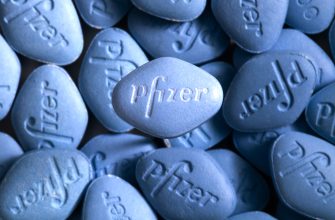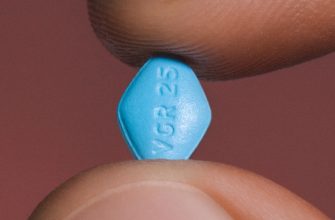Viagra, or sildenafil, primarily enhances blood flow to the penis, aiding men with erectile dysfunction (ED) in achieving and maintaining an erection during sexual activity. This medication works by inhibiting the enzyme phosphodiesterase type 5 (PDE5), which can restrict blood flow. By blocking this enzyme, Viagra allows the natural chemical called nitric oxide to take effect, facilitating an increase in blood flow when sexually stimulated.
Those considering Viagra can expect several effects beyond just treating ED. Improved confidence in intimate situations is commonly reported. Patients often experience an increased ability to engage in sexual activity, leading to a more satisfying experience for both partners. For many, this can rejuvenate relationships and improve emotional well-being.
It’s important to consult with a healthcare provider before use. They can ensure that Viagra is safe based on individual health conditions and medications being taken. Side effects, while generally mild, should also be discussed as they can include headaches, flushing, and digestive issues. Understanding the benefits and potential drawbacks allows for informed decision-making regarding this widely used treatment.
- What Will Viagra Do
- Understanding the Mechanism of Action of Viagra
- Key Steps in the Mechanism
- Timing and Usage
- Indications for Viagra Use: When is it Prescribed?
- Potential Benefits of Taking Viagra for Erectile Dysfunction
- Improved Blood Circulation
- Enhanced Emotional Well-being
- Common Side Effects and Risks Associated with Viagra
- Serious Risks
- Interactions with Other Medications
- Interactions Between Viagra and Other Medications
- Common Interactions
- Other Considerations
- Alternatives to Viagra: Other Treatment Options for Erectile Dysfunction
- Importance of Consulting a Healthcare Professional Before Use
- Assessing Health Conditions
- Avoiding Drug Interactions
What Will Viagra Do
Viagra enhances blood flow to the penis, aiding men with erectile dysfunction achieve and maintain an erection during sexual stimulation. This happens through the inhibition of an enzyme called phosphodiesterase type 5 (PDE5).
- Increases blood circulation: Viagra dilates blood vessels, allowing more blood to enter the penis.
- Heightens sexual response: While it does not induce arousal, it amplifies the body’s response to sexual stimuli.
- Time-efficient: Typically, Viagra takes about 30 to 60 minutes to start working and can last for up to four hours.
If considering Viagra, consult a healthcare professional. Discuss any pre-existing conditions or medications to avoid adverse effects. Common side effects may include headaches, flushing, or nasal congestion.
For optimal use, take Viagra on an empty stomach or after a light meal. This can enhance absorption and effectiveness. Avoid excessive alcohol, as it may impair performance.
Viagra represents a viable option for many men facing erectile challenges. Assessing personal health and preferences can guide you in deciding if it aligns with your needs.
Understanding the Mechanism of Action of Viagra
Viagra primarily works by enhancing blood flow to the penis, facilitating an erection in response to sexual stimulation. The active ingredient, sildenafil citrate, inhibits the enzyme phosphodiesterase type 5 (PDE5). This inhibition allows the accumulation of cyclic guanosine monophosphate (cGMP), a molecule that relaxes smooth muscle cells in the corpus cavernosum, leading to increased blood flow.
Key Steps in the Mechanism
When sexual arousal occurs, nitric oxide (NO) is released in the penis. NO activates guanylate cyclase, which increases cGMP levels. As cGMP rises, it promotes vasodilation, helping blood vessels expand. When sildenafil blocks PDE5, the breakdown of cGMP slows down, prolonging its effects and enabling a more sustained erection.
Timing and Usage
Viagra is typically taken about 30 to 60 minutes before sexual activity. The drug remains effective for approximately four to five hours, providing a window for spontaneous sexual encounters. It’s important to note that sexual stimulation is still necessary for an erection to occur, as Viagra does not induce arousal on its own. Avoiding high-fat meals before taking Viagra can enhance absorption and effectiveness.
For optimal results, consult a healthcare professional to determine the right dosage and discuss any potential interactions with other medications. Monitoring your response to the treatment helps adjust the approach as needed, ensuring the best outcome for your sexual health.
Indications for Viagra Use: When is it Prescribed?
Viagra is prescribed primarily for the treatment of erectile dysfunction (ED) in men. This condition manifests as difficulty achieving or maintaining an erection adequate for sexual intercourse. Healthcare providers evaluate factors such as the duration and severity of symptoms before recommending treatment with Viagra.
Additionally, Viagra may be indicated for certain cases of pulmonary arterial hypertension (PAH). The medication helps to relax blood vessels in the lungs, improving blood flow and reducing the workload on the heart.
Specific conditions leading to the prescription of Viagra include:
| Condition | Description |
|---|---|
| Erectile Dysfunction | Inability to achieve or sustain an erection due to physical or psychological factors. |
| Pulmonary Arterial Hypertension | High blood pressure in the vessels supplying the lungs, leading to shortness of breath and fatigue. |
| Post-Prostatectomy Rehabilitation | Assistance in restoring erectile function after prostate surgery. |
Physicians take into account a patient’s medical history, concurrent medications, and overall health before initiating Viagra therapy. Regular follow-up appointments ensure the treatment is effective and safe, addressing any concerns or side effects that may arise.
Potential Benefits of Taking Viagra for Erectile Dysfunction
Taking Viagra can enhance sexual performance and improve confidence in individuals experiencing erectile dysfunction (ED). By increasing blood flow to the penis, Viagra facilitates stronger and more sustained erections. This can lead to a more satisfying sexual experience for both partners.
Improved Blood Circulation
Viagra works by inhibiting an enzyme called phosphodiesterase type 5 (PDE5). This action promotes the relaxation of blood vessels, allowing for increased blood circulation. Many users report noticeable improvements in rigidity and duration of erections, which significantly contributes to overall sexual satisfaction.
Enhanced Emotional Well-being
Addressing erectile dysfunction can have positive effects beyond physical health. Successfully managing ED often leads to reduced anxiety and improved self-esteem. Many men find that restoring sexual function helps to enhance their relationships and emotional intimacy with their partners, making communication and connection stronger.
Regular intake, as prescribed, ensures optimal results. Consult a healthcare professional for tailored advice and to explore whether Viagra is suitable for you.
Common Side Effects and Risks Associated with Viagra
Taking Viagra can lead to several common side effects. Users often report headaches, flushing, and upset stomach as typical reactions. These effects usually diminish as the body adjusts to the medication. Some may experience nasal congestion, dizziness, or visual disturbances like color tints or blurred vision. It’s advisable to monitor these symptoms and discuss them with a healthcare provider if they persist or worsen.
Serious Risks
While many experience only mild effects, serious risks exist. Users with pre-existing cardiovascular conditions should consult a doctor before use, as Viagra can affect blood pressure. Priapism, an erection lasting longer than four hours, is a rare but urgent condition requiring immediate medical attention. Additionally, allergic reactions, though rare, can cause swelling and difficulty breathing. If any severe symptoms arise, seek emergency assistance promptly.
Interactions with Other Medications
Viagra interacts negatively with certain medications, particularly nitrates prescribed for chest pain. Combining these can cause dangerous drops in blood pressure. Other medications, such as some antifungal drugs and HIV protease inhibitors, may also impact how Viagra works or increase the risk of side effects. Always inform healthcare providers about all medications being taken to avoid complications and ensure safe use.
Interactions Between Viagra and Other Medications
Always consult a healthcare professional before mixing Viagra with other medications. Some drugs can significantly affect the way Viagra works or increase the risk of side effects.
Common Interactions
- Nitrates: Using Viagra with nitrates (like nitroglycerin) can lead to a dangerous drop in blood pressure. Safe use of these medications together is not possible.
- Alpha-blockers: Medications for high blood pressure or prostate problems can result in low blood pressure if taken with Viagra, particularly if dosing is not carefully monitored.
- Antiretroviral medications: Some drugs used for HIV treatment can increase Viagra levels in the blood, leading to higher risks of side effects.
- Antifungal medications: Medications like ketoconazole or itraconazole can also elevate Viagra levels, requiring an adjustment in dosage.
Other Considerations
- Blood pressure medications: Regular blood pressure medicines may have additive effects when combined with Viagra, necessitating adjustment for safety.
- Grapefruit juice: While not a medication, grapefruit juice can interact with various drugs, including Viagra, potentially enhancing side effects.
- Other ED treatments: Combining Viagra with other erectile dysfunction medications is not recommended due to increased risk of adverse effects.
Always provide your doctor with a full list of medications and supplements you are taking to ensure safe use of Viagra.
Alternatives to Viagra: Other Treatment Options for Erectile Dysfunction
Consider oral medications as an effective alternative to Viagra. Options like Cialis (tadalafil) and Levitra (vardenafil) also work by increasing blood flow to the penis, but they differ in duration and onset of action. Cialis, for example, can last up to 36 hours, giving more flexibility in timing.
Pain management therapies may also help those experiencing erectile dysfunction (ED) due to chronic pain. Medications like tramadol or gabapentin can manage discomfort while potentially improving sexual function.
Injection therapy provides another option. Medications like alprostadil can be injected directly into the penis to induce an erection. This method allows for a faster acting solution compared to oral medications.
Vacuum erection devices create suction to increase blood flow to the penis. These devices are non-invasive and can be a great choice for those who prefer to avoid medication or injections.
Psycho-social interventions can also play a key role in treatment. Therapy or counseling can address psychological factors contributing to ED, providing strategies to improve confidence and reduce anxiety related to sexual performance.
Herbal supplements, such as ginseng or yohimbine, may offer natural alternatives. While some individuals report positive effects, it’s crucial to consult a healthcare provider before starting any new supplement to avoid potential interactions with other medications.
Lifestyle modifications significantly impact erectile function. Regular exercise, a balanced diet, and maintaining a healthy weight can enhance overall health and improve ED symptoms. Quitting smoking and reducing alcohol consumption also contribute positively to sexual health.
Discussion with healthcare providers is key. They can tailor treatment plans based on individual health needs and preferences, ensuring the best possible outcomes in managing erectile dysfunction.
Importance of Consulting a Healthcare Professional Before Use
Consult a healthcare professional before using Viagra to ensure it’s safe and appropriate for your situation. Your doctor evaluates your medical history, current medications, and underlying health conditions that could influence the effectiveness and safety of this medication.
Assessing Health Conditions
Certain health issues, like heart disease, low blood pressure, or liver problems, may increase risks when using Viagra. A healthcare provider determines whether these factors apply to you and can recommend suitable alternatives if needed.
Avoiding Drug Interactions
Some medications, particularly nitrates used for chest pain, can cause dangerous interactions with Viagra. Discussing all prescriptions and over-the-counter drugs with your doctor ensures you avoid severe side effects and complications.








